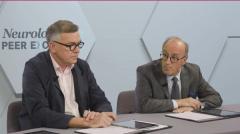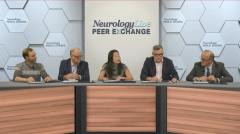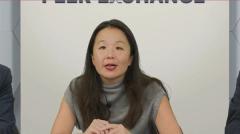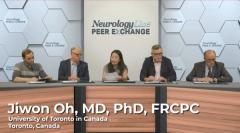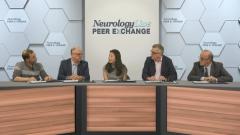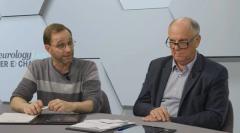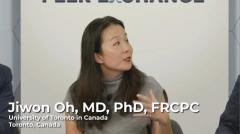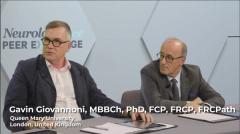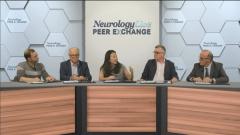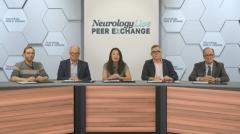
BTKi Treatment Paradigm
Neurology experts discuss where BTKi’s fit in the multiple sclerosis treatment continuum.
Episodes in this series

Jiwon Oh, MD, PhD, FRCPC: So, I know many of you have already hinted at this, but one final question to everybody: Say the BTK inhibitors do show evidence—and we talked about how that evidence will manifest, whether it's the relative effect on relapses and progression or various different measures—Patrick, like you said, cognition, patient-reported outcomes. So say there is a convincing effect that BTK inhibition not only decreases relapse biology but also nonrelapse disease biology. Where in the MS treatment paradigm do you think these agents would fit? For what types of patients would you use these agents across the whole spectrum?
Patrick Vermersch, MD, PhD: Assuming safety emerges as mild—it depends on the ratio between the benefits and risks, of course—but if we think the safety will finally be relatively good or very good, the tolerability is really excellent, you know that's true for all the drugs in this family. To me it's not possible to dissociate the B-cell biology and the biology related to slowly progressive disease. So I think, in my opinion, to target both very early is key because we know in radiologically isolated syndrome and clinically isolated syndrome we have such subtle changes. You know, primary progressive MS is probably present very early. So why only target B cells? Why not target both microglia and B cells very rapidly?
Gavin Giovannoni, MBBCh, PhD, FCP, FRCP, FRCPath: And the corollary is, if it doesn't work that well, then we obviously have to go back and think about T cells.
Amit Bar-Or, MD, FRCPC: Well, one keeps in mind that both anti-CD20 therapies and BTK inhibitors do affect T-cell responses indirectly. Indirectly, yeah. But they do measure that, and that may be part of the therapeutic mechanism of action.
Gavin Giovannoni, MBBCh, PhD, FCP, FRCP, FRCPath: Yeah, that's actually something I hadn't thought about in enough detail: the impact of BTK inhibitors on T-cell biology. I mean, in his plenary talk, Steve Hauser did mention that we mustn't forget the T cell because he said there's something very interesting about hematopoietic stem cell transplantation, alemtuzumab, and cladribine—they all target both B and T cells. We mustn't forget that, because I think the pendulum has completely swung into B-cell biology, and we're forgetting that the T cell is probably as important as the B cell.
Amit Bar-Or, MD, FRCPC: I hope where we land is recognizing that it's about interactions, not about one cell alone.
Gavin Giovannoni, MBBCh, PhD, FCP, FRCP, FRCPath: Yeah, that's true. Did you disagree with me about using BTK inhibitors across the whole spectrum?
Jiwon Oh, MD, PhD, FRCPC: Oh, no, no, I completely agree. Actually, I think the entire panel agrees. So long as safety is acceptable, and then just wanted to know—we talked about earlier how cumbersome lab monitoring may be, depending on what pans out with safety and the phase 3 clinical trials—but should BTK inhibition show a convincing effect on nonrelapse disease biology, I think that's a burden that patients would be willing to undertake early on: frequent monitoring, even if it's every week for 3 months, given that we don't have any other agents that convincingly modulate CNS-compartmentalized disease biology. That's probably a burden that patients would be willing to shoulder. And we, as clinicians, would recommend.
Gavin Giovannoni, MBBCh, PhD, FCP, FRCP, FRCPath: Agreed. And as I said to you earlier, there are now point-of-care blood spot testing kits for liver function tests where you can come in and get a readout literally in 5 minutes on a desktop device, which will make it easy for the individual patient rather than having to send it off to the lab and wait. And then with lateral flow technology, if we can get home monitoring of liver function tests, that will completely transform monitoring for this and other drugs with hepatotoxicity risk in a small number of patients. We can shift the burden onto the individual patient at home. And it'll probably come with an app to send results centrally and all that. So I think technology will sort out the problem for us.
Jiwon Oh, MD, PhD, FRCPC: That sounds great. Final question, not necessarily about BTK inhibitors: Can I ask each of you—if you look into the future, what's the most exciting development happening in the MS field that you think will beneficially affect patient care in the coming years? Patrick, can we start with you?
Patrick Vermersch, MD, PhD: Maybe I can give you two examples. I was impressed by the preliminary data about CAR-T cells. I think we have a couple examples, both from the pharmaceutical industry but also academia, showing it could also change the picture of MS: induce tolerogenic immune cells quite rapidly, quite impressive. Of course it's not for all patients—it's a complex procedure, of course. Maybe it could be discussed at that point. The second could be the preliminary data we have with fremanezumab targeting CD14 ligand, also targeting innate immunity like BTK inhibitors: microglia and macrophages. Maybe two examples.
Jiwon Oh, MD, PhD, FRCPC: Thank you. Gavin?
Gavin Giovannoni, MBBCh, PhD, FCP, FRCP, FRCPath: For me, it's the Epstein-Barr virus story. It's pretty compelling now that EBV is in the causal pathway for MS. Whether or not it triggers or drives the disease will be answered in the next decade. But there's a compelling rationale now for doing vaccine studies to prevent the disease. Wouldn't that be exciting if we could prevent MS with a vaccine? So for me, that's the most exciting news.
Jiwon Oh, MD, PhD, FRCPC: Thank you. Kris?
Krzysztof Selmaj, MD, PhD: Some of the exciting things in the MS field—it's difficult to list them all. But I agree EBV of course is very interesting. When we talk about closer perspectives, BTK inhibitors are one thing we should discuss. Also I think the trials just started with costimulatory inhibitors, antibodies to costimulatory molecules like CD40—also microglia are involved, T cells, this is a kind of classical immune approach but targeting a different class of molecules. So it may happen we can get some good results. But I think the final, very attractive, maybe longer-term perspective is work on induction of immune tolerance because we need to tolerate autoimmune cells, just the autoimmune cells.
All these therapies we're discussing now target all types of cells. We're happy to eliminate or modulate the autoimmune cells but at the same time you also affect cells needed for immune homeostasis. When we can develop focused immune tolerance therapy, that would really be very relevant for selective and safe treatment.
Amit Bar-Or, MD, FRCPC: I hope that perhaps next time we are together, we will be able to talk about the near future of actually fixing things already broken in terms of repair.
I do think we are on the cusp, hopefully through BTK inhibitors, of for the first time more meaningfully impacting CNS-compartmentalized disease and nonrelapsing progression. So I completely agree, and I think fremanezumab is an example targeting both periphery and CNS inflammation for both aspects of the biology.
An area we're also getting closer to: We haven't quite solved relapsing MS—we continue to treat patients, exposing them to treatments. What's the prospect for when and how to stop treatment? But can we take advantage of depletion-reconstitution biology and figure out how transient immune system treatment and reeducation can occur? We've discussed this for decades, but I think we're closer to getting traction and designing trials to answer that question which, hopefully for the future with very early intervention, may translate into preventing not just relapse biology but also CNS-compartmentalized inflammation if we're correct it's seeded early by relapse biology. So early intervention may change if not abrogate disease trajectories, as we've seen with autologous hematopoietic stem cell transplantation in small numbers of patients.
Gavin Giovannoni, MBBCh, PhD, FCP, FRCP, FRCPath: The thing about CD40 ligand—that may reinduce tolerance in an antigen-agnostic way without needing to know the autoantigen, because I don't know if we know the autoantigen in MS. We can debate that.
Jiwon Oh, MD, PhD, FRCPC: So I agree with all of you—you've highlighted the most exciting developments. I think it's really all these new pathways being evaluated as therapeutic targets. Thinking outside the box. Hopefully additional agents will be available soon that repair and remyelinate. But also getting to this idea of intervening closer to disease onset, the only way we'll eventually develop a cure. There's been a shift focusing on earlier stages, when we used to say radiologically isolated syndrome wasn't MS but now know it is, along with the prodrome. But now we're getting to the actual onset with the EBV story. So hopefully a cure is coming in the next few years.
I want to thank you all—our excellent panelists—for this rich and informative discussion. And thank you to our audience for watching this NeurologyLive peer exchange. If you enjoyed it, please subscribe to our e-newsletters to receive upcoming exchanges and other great content in your inbox. Thank you very much.
TRANSCRIPT EDITED FOR CLARITY
Newsletter
Keep your finger on the pulse of neurology—subscribe to NeurologyLive for expert interviews, new data, and breakthrough treatment updates.

